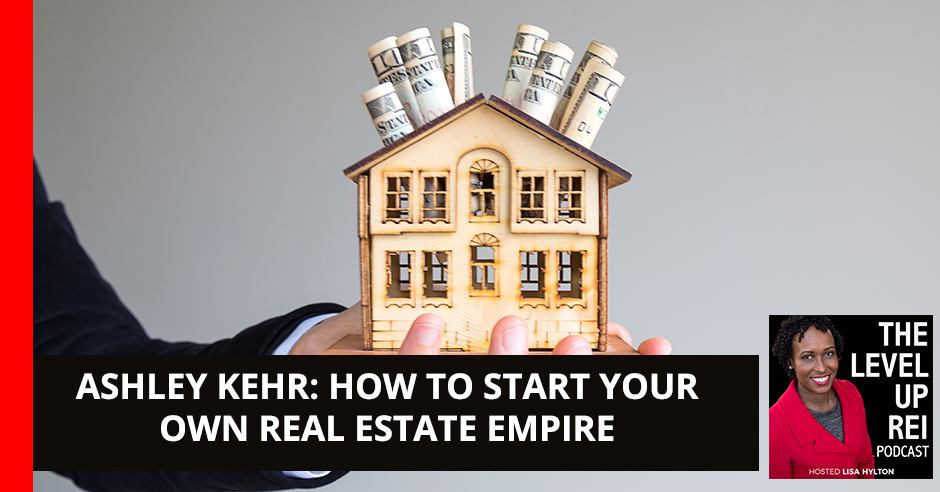
To build your own real estate empire, you must have a proper understanding of how the industry works. On top of that, you must also prepare your finances accordingly and know the right people to do business with. This is what Ashley Kehr did, transforming her simple farming life into a professional real estate investor. She sits down with Lisa Hylton to talk about her journey in this industry and how she eventually landed as the co-host of the Real Estate Rookie Podcast. Moreover, she shares some tips on choosing properties to do business on, how the real estate works amid the pandemic, and how to forge the right partnerships.
—
Watch the episode here
Listen to the podcast here
Ashley Kehr: How To Start Your Own Real Estate Empire
I’m excited to bring you guys yet another episode, but before we get started, as always, I want to encourage you to head over to my website, which is www.LisaHylton.com to learn more about passively investing, apartment syndications, and to learn more about building and getting started in real estate in general. Without further ado, let’s get started with this episode. Our guest is Ashley Kehr. Ashley is the cohost of the Real Estate Rookie Podcast. She’s a few years removed from being a beginner herself and is now helping newbies figure out actionable steps to get their first deal. She has a dual degree in finance and public accounting and became a licensed insurance agent.
—
Welcome to the show, Ashley.
Thank you so much for having me. I’m excited to be here.
I’m excited to have you on. Before the show, I was sharing with Ashley that I met her and Steve Rozenberg on Instagram. Steve was doing a live coaching with Ashley and I was inspired by it. I was telling her I still have notes from that coaching that I took down and I was like, “This is so good.” I appreciate you putting yourself out there and allowing us to learn while you’re learning as well.
I read Steve’s book back in January 2020. I met him on Instagram too. I send him a message and said how much I liked it. I told him a bit about what I was doing and wanting to do. He said, “Let’s talk. I think I can help you with some stuff but you have to do it or else I’ll never talk to you again.” From there, he was coaching me and he still does. We decided to do it live one day on Instagram and we’ve done it a couple of times. Now, we’re doing it with other people too. It’s been a lot of fun and a great learning experience.
I also follow you on Instagram, I’m inspired by all of your projects. All the projects that you guys are doing are so good. We’re going to jump right into this episode, plus you did accounting and finance. There are so many good things to talk and learn about how your experience has evolved over time and how you got started. How did you get started investing in real estate?
I started working for an investor. I had worked as an accountant at a public accounting firm and I had interned there during college. I was offered a full-time job after college. I quit during the tax season. I hated it. As guilty as I felt quitting in tax season, I had to get out of there. I could not sit at my desk anymore every single day. I also didn’t feel I excelled at it. What bothered me was that I wasn’t great at doing it. I still had questions, I was unsure of things, I didn’t like that, and I didn’t enjoy learning more about it. I was offered a job from my friend’s dad. He had a 40-unit apartment complex and he’s like, “I need someone to run it for me and keep me organized. It will be part-time.” I accepted and it eventually turned into a full-time job. He bought another apartment building and then I took on some commercial units for him. I started thinking, “If he’s doing this, why can’t I?” It propelled from there.
What was the first property of your own?
I worked for him for about two years. He had a son that was two years older than me, we had become pretty good friends, and I grew up with a sister. I approached him if he would want to partner on a deal with me. I knew he had a bunch of savings so he had money that we could invest. I had the experience and knowledge of running a rental unit and I knew what to look for when purchasing one. I found us a duplex and he paid for it in cash. We created an LLC where we were each 50/50 in LLC. The LLC also paid him a mortgage payment every month for the money he had put in to purchase the property.
He had 50% equity. He’s getting 50% of the cashflow but he was also getting a monthly payment of principal and interest. The interest is 5.5% and he’s still getting that from the LLC. That’s how we structured it. I do think it was favorable to him that he’s getting all of his money back that he invested plus interest and 50% of the cashflow, and he is extremely passive. I’ve taken care of everything as we’ve slowly grown our portfolio. I don’t regret giving him this generous offer because there still were a lot of risks to him trusting me to do this.
After you decided to do the duplex with him, were you still property managing the other properties that you were working full-time on?

Real Estate Empire: Invest in small rural towns where you don’t have a ton of investors competing for properties.
Yes. I made it easy because I was already doing property management full-time and when I say full-time, I was available 24/7 for these properties. It made sense for me to do it on my own because I was already making myself available. I was already doing the same things every day. I already had maintenance people I could use and stuff like that. I had access to leases, everything like that so I did both.
You mentioned that when you approached him, you knew what properties to look for. After you left the staff accountant job and you started doing the property management role, in that period of time, what were some of the key things that you learned that enabled you to choose the duplex that you chose?
When I started managing the apartment complex, it was boxes of files and keys in a drawer like, “Here you go, here’s the property, go ahead and manage it how you want.” I had to learn a lot. It took me a long time to get a good system in place and we ended up going to software. I had to manage all the money for this apartment complex and the future ones he purchased. I learned a lot as to when I’m running my numbers, what I have to account for from having the experience of running those properties I got. We purchased the duplex in the same area as those apartment complexes that I was managing so I knew what market rents were. I knew how much different repairs costs in that area to get a maintenance budget together. I knew what it costs to get the grass cut. I knew what the insurance costs so that helped a lot.
Given that this first one was in that area, did it make it a little bit easier to find it or not?
I used a realtor and she would send me listings every day. It was the only one we went and looked at. We bought the first one we looked at. It’s a smaller town so there wasn’t a lot available but we ended up purchasing that one.
You still have it?
We sold that in November 2019.
Was it a good deal?
Not my best deal for sure. I didn’t run my numbers as good as I do. It wasn’t the best cashflow but it still made money. I’ve improved what I’m looking for and I work a little harder for my deals too.
We’re going to dive into a couple of that. The first is, how do you play now? When you say that you work harder for your deals, what do you mean by that?
I am doing rehabs where before, it was cosmetic updating like that first property, it’s new flooring, a splash of paint, and we did change a couple of cabinets that my partner’s roommate did for us for free. I continued for several years doing that either. They were turnkey or a couple of cosmetic updates but now, I’m doing full rehabs on properties. I’m finding that I’m getting a bigger bang for my buck and a better return doing it that way.
Don't leave emotions out of real estate. Share on XWould you say that what you did before was light value add and what you’re doing is deep value add perhaps?
That’s a great way to put it. I am still finding properties that are undervalued by the seller. For example, I bought one property for $35,000 and I didn’t do anything to it except put a fridge in it. A week after closing, it appraised for $55,000. I got it at a great discount from the purchase price.
That’s in the case where some of these sellers don’t know what they’re hauling on to.
I am investing in these small rural towns where you don’t have a ton of investors competing for properties so you’re not seeing a lot of multiple offers or people watching for these great deals to come up.
When you say small rural towns, where is it that you live?
I live outside of Buffalo, New York. I live on a dairy farm with my husband so we are rural out there and I invest in the south towns of Buffalo.
Would you say that it’s a 5 to 10-minute drive from where you live to your properties or the places you invest?
My farthest property is 30 minutes from my house. I have two properties in South Buffalo. They’re within the city limits right on the border of the south towns. That’s to the north of me and then I have another one that’s about 25 to 30 minutes to the south of me. That’s even more rural. The rest are ten minutes within my house because it takes ten minutes to get to town from my house.
What is your ideal type of property? The reason I’m questioning that is because I saw on Instagram where you were looking at this property that was a retail at the bottom, apartment at the top, and an office space too. I’m not sure if you have an ideal but maybe you do.
When I first started out, I wanted duplexes or triplexes, and I wanted to work my way up to huge apartment complexes because it was more cost-efficient having more units under one roof. Now that I’ve gone through managing that and have my own tenants, I do not like to deal with tenant disputes between the tenants living together. I’ve gone a lot more towards single-family and in our area, the owner of the property has to pay the water bill so there’s only one water meter per property and it’s not separately metered if you have 2, 3, 4 units.
If you buy a single-family home, you can have the tenant pay the lawn care, the snowplowing, the water bill. If you have multifamily in this area, the landlord pays for that because it’s hard to divide that up evenly between the residents. We have a single-family home that we rent out but I bought my first full rehab single-family home. We’ll see how it goes. I did purchase a four-unit that had two residential upstairs and two commercial downstairs. These are my first commercial units.

Real Estate Empire: Property management helps a lot in overseeing and picking a great property management firm.
You own and manage on your own as well.
I gave up management and it has been the best thing. I feel like a huge weight is off my shoulders. I gave all of our units to a great property management company in Buffalo and I’m still managing this investor’s money. I’ll get the owner reports sent to me, any questions the property management company has, I still answer them for him.
Can you talk a little bit about the reason you chose to move away from the property management role?
In June 2019, the Landlord-Tenant Laws changed drastically in New York State and they became a lot more tenant-friendly. That happened and then I had this tenant who would call me at 3:00 AM. I set up separate Google Voice numbers for my residents to call if they had a question on my phone. That was turned off at night and they had an emergency maintenance line that they could call but she would leave me voicemails at 3:00 AM saying the boy that lived next to her was coughing and she could hear it through the wall.
That put me over the edge waking up to these messages. It upset me because I like all my tenants to be happy. The fact that she was so miserable and the other person was getting miserable because she would bang on the wall and wake up the other kids. I had found out I would be hosting this new podcast for BiggerPockets. I wanted to have more time for that. All of these things put together. I decided to take the leap. I had started budding the property management company in September 2020. We finally pull the trigger for them to take over in February 2021.
What advice would you have for people starting out who are thinking property management, no property management?
I liked that I know how to do property management, it helps me oversee, and helped me pick a great property management firm but I’ve been mentored by Steve Rozenberg. He used to run his own huge property management company. He’s opened up my eyes to the liability that comes with being a property manager. You do have to know the laws, the fair housing rules, and stuff like that. If you have the time to teach yourself and learn all that, which years ago I did when I first started out, I was being paid full-time and that was my job to know all this stuff. With them changing, I didn’t want to keep learning. They kept changing every couple of years. If you have the time to learn the rules and there are a lot of housing places in different cities that offer free classes. I did one in the Buffalo area. It’s called HomeNY.org. They produce a book too with all of the Tenant-Landlord Laws. It’s a guide for you. They do the free classes that you can sign up for.
Before I move on to the Rookie podcast, these days, you look at your deals a little bit harder. You do more detailed analysis compared to when you bought that first duplex. Could you touch a little bit about what are some of the key things you are doing that are different especially in light of the economy, COVID, and how that has impacted the way you look at deals?
When I first started out, I didn’t leave the emotions out of it. I was like, “I want this property. I want this to work. I would fudge my numbers to make it work.” If I have this snowplow driver do these two properties, I can get a discount, push the rent a little bit and I would increase it, or instead of fifteen-year term, I’d do 30-year term. I would do these without even knowing for sure I could get these discounts or these rent increases. Now, I’m doing it as a worst-case scenario like, “I know I could get $700 for a two-bedroom apartment.” Before I would’ve been, “I can push it to $750.”
If I keep pushing my rent up and I keep decreasing my expenses, it’s going to end up to be a huge difference if that’s not the reality. I run my numbers as what they are. What expenses I get from the seller, what the recurrent rent is, or what it’s rented at if it’s taken. I run the worst-case scenario then I also run a best-case scenario to see like, “If I do get that higher rent, it would double my cashflow and be great.”
I’m not going to count on that. I would recommend the worst-case scenario. Since COVID, I’ve bumped up my reserve percentage. When I purchase a property, I make sure I have my reserves in place ahead of time. For anyone that’s planning to save their reserves as they go along with their cashflow or build them up even more, I used to do CapEx 5% for repairs and maintenance and 5% for vacancy. I’ve bunked each of those up to 6% each for any new properties going forward. I have the same reserves in place for the properties I have.
Always bring to the table what you can and find what you need to go along with that. Share on XThis is all to help weather the storm.
I thought buy and hold was one of the least risky investments to have, but COVID has changed that for us. There are a lot of people who are not receiving rent payments because of the hold on evictions. In New York State, we still have to go until August 2020 until you can file an eviction. So far, I’ve been lucky. There have been people that haven’t paid late. I have received all my rents but it makes me more cautious. To sleep at night, I should build my reserves up a little more.
I want to talk about the Rookie Podcast but I also want to talk a little bit about building a real estate business while having a family. You have three boys and you live on a dairy farm. Does your husband play in real estate too?
He has his first rental property under contract. It’s going to be a short sale, hopefully, but it’s been dragging on forever. I hope he gets to close on it but he’s buying more farmland and on it are two single-family houses and a manufactured home. He’ll be renting out the three of them. I’m excited for him. He helped me on my rehab that I was doing. Before that, he ran the farm and I was building this real estate business on the side of my full-time job. It’s exciting that I can do it full-time.
With our family, with our kids, he is their primary caretaker during the day, especially during the summer because they want to be outside with him on tractors, four-wheelers, and doing that. He has to milk the cows every morning and every night. During the day, if he’s not doing fieldwork, he can be flexible. He does their doctor’s appointments and stuff like that. I’m lucky to have him to help with the kids. They stay home with us and whoever needs to do something, the other one takes them and it’s been nice, us both working at home.
Circling back to rehabs because you mentioned that he helped you. When I asked you, how do you play these days and you’re like, you play in full rehabs. For a lot of people who are females thinking, “This lady is doing full rehabs.” Can you talk about how you manage the process of executing that strategy?
I had no idea what to do. Managing my own rentals over the years and these other investors, I learned some stuff from talking with the maintenance guys or hiring contractors who were there. I knew that I could not handle full rehab by myself so I have a partner. This is different than my first partner. We have a duplex and a triplex together. I approached him if he’d want to do rehab with me. We bought our four-unit commercial building together and he has helped me rehab the whole building. He has construction experience. I paid for the property and we shared rehab costs. He taught me a lot for six months.
It’s been quite a learning experience but I can install vinyl plank flooring, patch drywall, and my painting has got a lot better. It’s been great to learn from him and also still have him work side-by-side with me and this new property I purchased we were also doing together. I am not comfortable yet doing a full rehab by myself but this property, we’re going to try and hire out a lot. He does landscaping so he’s extremely busy. We’re going to see how this project goes with hiring a lot of stuff out. That would also make it easier for me to do properties on my own in the future once we get a good system in place. We get along. He’s good as a partner. We’ll continue to do deals together anyways.
It leads nicely into the article that you wrote on BiggerPockets which is talking about the four steps to creating a great partnership as a rookie real estate investor. Could you talk about the reason why you decided to write this article and share a couple of the steps?
I wrote the article together with Felipe Mejia, my co-host on the Real Estate Rookie Podcast. We received a lot of questions about partnerships, so we decided to put together a blog post about it for BiggerPockets. The first thing when you’re wanting to find a partner is, what do you look for in a partner. I was always like, “You want to look for someone who has different strengths than you so you complement each other.” Felipe brought an interesting perspective. He said, “What do you bring to the partnership?” That’s what you should focus on first. It’s what you are bringing to the table and then find what you need to go along with that. One thing I always like to recommend and I’ve done this before is put together a binder.
I do this for loan officers for the bank too. Of all the deals that I’ve done, I include the BiggerPockets calculator report showing what that property is cashflowing. I provide pictures of the property, my personal tax returns, and my personal financial statement. I give enough information to whoever I want to be my potential partner or to the loan officer showing that I’ve had success and this is the new property I’m looking at. This is what it could cashflow, stuff like that.

Real Estate Empire: Always run both the worst-case and best-case scenarios when dealing with real estate.
I tried to be an open book because I want them to trust me going forward, I want them to see that I am responsible with my own personal finances, and that’s why they should invest with me. That’s important to have your own personal finances in order before you start into real estate investing, especially partnering with someone. That doesn’t mean you have to have a ton of money. That means you know how to manage the money you have.
Be open and honest with your finances. What I did with my first partner was I planted the seed. I didn’t go up to him and say, “Can you give me money and be my partner in this real estate deal?” I started talking to him about, “This is cool what your dad is doing. Did you ever thought about doing that?” Each time we talked, I would bring it up again and not ever say anything about, “Will you partner with me?” “I’m looking for money,” or “I need someone.” He started to see it as an opportunity for him. He was like, “You know what to do. I want to invest with you. I have money.” Planting the seed and it seemed like an opportunity for them is important.
Going back to the second point that you talked about, the binder of all your deals. For someone starting out, they might not necessarily have any deals underneath their plate. What I’m thinking is they could show how they’re managing their own finances then. Is that what you’re talking about?
Take the property that you want to purchase and a couple of other properties that you’ve analyzed and say, “I’ve looked at these four properties and this is the one I want to buy because this one has this cashflow,” or “I don’t want to buy this one because it would be a negative cashflow or it needs this expensive foundation repair.” It’s to show them that you’re not randomly picking one property but you know how to analyze the deal. Show them that this is the right property and these are the wrong properties because.
That brings me then now to the Rookie Podcast. Can you talk about the reason why you decided to do a podcast and how the partnership came about? Let’s start there.
BiggerPockets have real estate podcasts and they had put on there that they were thinking of starting a new podcast if anyone had any ideas for the show. I submitted an application that I wanted to talk about how to build wealth and a legacy for your family. I had gone through a bunch of the Real Estate podcast episodes and when they ask people, “What’s your why? Why do you do real estate?” Almost every person said, “It was for my wife, kids, family, and to build a legacy.” They had called me and said, “We liked your idea but we don’t think it’s enough for a full show, but would you be interested in being a host at the show?”
That was exciting. They matched me up with my cohost Felipe and we had to do a whole sample show that we had to send to them. We went through a bunch of steps, jumped through hoops, and a big audition. They vetted us and we made it to the top three. On December 16th, 2019, I was singing Happy Birthday to my mom and my phone rang as soon as I’m done. I answered it and they offered me the host position. That’s how it came about. We started taping almost right away and March 2020 is our first episode released.
I have a lot of friends that love your podcast.
Thank you so much. It’s been fun to do and I am learning so much too, because I still consider myself somewhat of a rookie. I haven’t been doing this that long and it’s so great to learn from all the guests we have on the show.
What would you say is the biggest lesson that you may have taken away from some of the guests there that you’ve had or from doing the show?
The biggest thing is I’ve always wanted to do out-of-state investing. We had Elyse and she is from California where it’s expensive to invest in real estate there. For her first deal, she started doing out-of-state and within a couple of years, she is in three different states. I love learning all the different ways you can do in real estate. It doesn’t matter where you live, how much money you have, who your connections are, there are so many different ways to get started in real estate.
Try to be an open book so people can easily trust you moving forward. Share on XIs there anything that I didn’t touch on that you would like to share before we get into the level-up questions, which are the last questions?
I don’t think so.
These are my level-up questions. The first one is, what are you grateful for in your life?
I’m grateful for my mom because she has been off work due to COVID and she has watched our kids a lot, especially when I’ve been trying to finish up this one rehab and my husband has come to help me. My mom is graciously taking the kids. We do try to work a lot with the kids, but it goes a lot faster when they’re not there because they want to be very helpful. I’m grateful for my mom and how she’s been so available to help out with our kids.
What has attributed to your success and continuous growth?
I would say partnerships. I could have got started without having that money partner, at least got started when I did. Even with the rehabs, I never would have jumped into rehabs without my other partner either.
Lastly, what do you now know that you wish you knew at the beginning of your journey?
I wish I would’ve known about BiggerPockets. I started investing in 2014. I purchased my first property at the end of that year and I did not find BiggerPockets until January of 2017. In 2017, I tripled my portfolio after I found BiggerPockets. That made a big difference. If I would have found them sooner, I would have grown faster and better to had stronger deals.
When you found them in 2017, what was it that enabled you to triple?
The biggest thing was reading about all these other people investing, the motivation, and the connection I felt with them because I started my real estate Instagram account in June 2019. I wasn’t even connecting with people online at all about real estate investing. I didn’t have anyone I knew in my area that was real estate investing at that time. I hadn’t even connected with my second partner. My first partner was completely passive. We like to talk about it and stuff but he didn’t know it on the level that I did. I think seeing this whole community motivated me so much to keep going, doing this, gave me that excitement, and new ideas of how to do creative financing. That year, I did my first seller-financing deal.
It leveled out. You’re investing to a whole new level. I’m so excited that I was able to have you. I love your story of how you’ve been able to continue to grow and still keep growing. If my readers want to learn more about you, your offerings, and where to find you, what is the best place they can go to?
On Instagram, it’s @WealthFromRentals. I’m also on BiggerPockets, you can search my name, Ashley Kehr.

Real Estate Empire: Have your own personal finances in order before you start into real estate investing, especially when partnering with someone.
Thank you so much, Ashley, for coming.
Thank you for having me.
—
Thank you so much, Ashley, for coming on the show. I appreciate it. It’s such an awesome episode. Some of my key takeaways. Number one, she talked about leaving emotions out of analyzing the deal. Number two, not forcing numbers to work, making sure that you’re looking at worst-case scenario, best-case scenario, running all the different scenarios, and making sure you understand how this property is going to perform. For you guys who haven’t looked up her article, she does have an article on BiggerPockets. It’s called 4 Steps to Creating A Great Partnership as a Rookie Real Estate Investor. On this episode, she talked about when looking for a partner, some of the key steps that she’d recommend is start with you, what do you bring to the table? What are your superpowers? What do you like to do?
Number two, a binder of all your deals and finances. For a lot of people starting out, they don’t have any deals to put into a binder but you have your personal finances and how you’ve been running them. Being able to show that you have a good credit score and cash. Once you get those deals, putting those in, and you’ve analyzed deals. Showing the deals that you’ve analyzed, the numbers that you’ve run, how you assess which deals you wanted to go after, and which ones you didn’t want to go after based on, “This one’s not going to cashflow whereas this one is.”
The third was planting the seed. She talked about coming right out the gate with I’m looking for money or I have a deal. Instead of taking that route, start taking the route of saying, “Have you considered investing in real estate or investing this way?” Eventually, people start to see, “There’s an opportunity here to invest.” They see it as an opportunity that they would like to do. Lastly, if she had to do looking back what she would have done earlier was get connected to BiggerPockets because for her, after she got connected to BiggerPockets, she tripled her real estate investing.
That’s powerful. Being around the right community of people, I can attest, resonate, and help you to level up your investing game to insane levels. You want to get connected into a community that nurtures you, encourages you, motivates you, inspires you to go after and achieve your goals. I hope reading this blog is one of those areas that you feel supported and inspired to continue getting after it. Until next time, keep leveling up. Take care.
Important Links:
- Real Estate Rookie Podcast
- Ashley Kehr
- Steve Rozenberg – Instagram
- HomeNY.org
- Article – 4 Steps to Creating a Great Partnership as a Rookie Real Estate Investor
- Elyse Rasmussen – Real Estate Rookie Podcast previous episode
- @WealthFromRentals – Instagram
- Ashley Kehr – BiggerPockets
About Ashley Kehr
 Ashley lives on a dairy farm in Buffalo, NY with her husband and three young boys. She purchased her first rental property in 2014 and since then has grown her buy and hold portfolio to over 30 units. She has experience in residential and commercial properties. She accredits much of her success to the use of partners on several real estate deals and creative financing.
Ashley lives on a dairy farm in Buffalo, NY with her husband and three young boys. She purchased her first rental property in 2014 and since then has grown her buy and hold portfolio to over 30 units. She has experience in residential and commercial properties. She accredits much of her success to the use of partners on several real estate deals and creative financing.
Ashley developed a passion for real estate after quitting her staff accountant job to work as a property manager. Within several years, she had created two property management companies, which she ran for over five years. Her specialty was creating systems to work efficiently and remotely within the companies.
Currently, Ashley outsources property management and spends her time educating new investors and finding deals to BRRRR.
Love the show? Subscribe, rate, review, and share!
Join The Level Up REI Podcast Community today:

Recent Comments